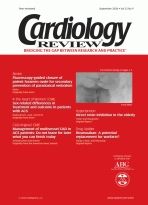Publication
Article
A good night's sleep is heart healthy
Sleep apnea is a serious, potentially life-threatening condition that is underdiagnosed and mostly untreated in African Americans, who are at greater risk due to their higher prevalence of obesity. The repeated cessation of breathing while sleeping due to pharyngeal obstruction contributes to hypertension, heart disease, depression, anxiety, daytime sleepiness, and fatigue. As I become more familiar with the literature, I am now invested in helping to raise awareness among our colleagues so we can better help our patients. By employing good evidence-based medicine we can create dramatic improvements in quality of life.
Perhaps the most scholarly body of knowledge on sleep medicine I have encountered is Chapter 19 of Cardiovascular Disease and Diabetes (McGraw-Hill, 2007), a new book by Association of Black Cardiologist member Luther Clark, MD. The chapter is entitled "Associations of sleep apnea to cardiovascular disease: role of diabetes and metabolic syndrome." The scholarship of the entire work is excellent, but Chapter 19 is particularly well done. Drs Girardin Jean-Louis, Ferdinand Zizi, Luther Clark, and John Kassotis set out the science underlying the case for the recent emphasis on sleep apnea as the next frontier in the reduction and elimination of cardiovascular disease (CVD) and stroke.
Although most individuals with sleep apnea have not received a comprehensive sleep assessment, sleep apnea and CVD morbidity are now conclusively linked and recognized as an independent risk factor. According to Dr Clark, sleep apnea affects as much as 15% of men and 5% of women between the ages of 30 and 60 years. In addition, 82% of men and 93% of women with moderate- to-severe sleep apnea are undiagnosed and untreated. In the clinical setting, more than half of patients with established CVD have sleep apnea.
I urge all cardiologists to learn more about sleep apnea and be sure that patients who are affected are not needlessly suffering from a condition that is very easily diagnosed and treated. With the advent of continuous positive airway pressure machines, effective treatment is readily available.






